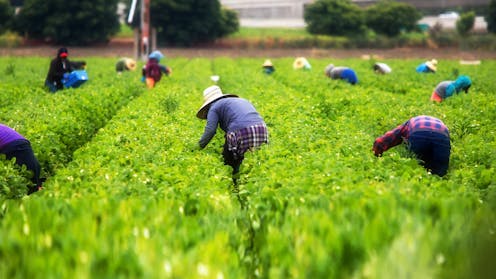Why Australian unions should welcome the new Agricultural Visa
- Written by The Conversation

Unions have been quick to condemn Australia’s new Agricultural Visa, which will give approved employers access to “skilled, semi-skilled and unskilled” workers from ASEAN nations and the UK from late this year.
ACTU president Michelle O’Neill has warned of a “second-class workforce” with “none of the protections or rights that all Australian workers should be able to rely on”. But many aspects of the visa are actually a step in the right direction and could provide unions with organising opportunities.
The scheme is being sold as a complement to two existing schemes, the Seasonal Worker Programme and the Pacific Labour Scheme.
In reality, it’s a concession to farmers who lost rights to British backpackers.
Australia waived the requirement for backpackers to extend their working holiday visas to complete three months of work in regional Australia as part of negotiations for a UK-Australia free trade agreement.
In filling the gap left by backpackers, the visa program has introduced provisions that will protect the interests of incoming workers.
One is the ability to move between employers.
The Seasonal Workers’ Program and the Pacific Labour Scheme bond workers to single employers, making it hard for them to escape mistreatment.
As the president of the Vanuatu Association of Public Service Employees, Dr Basil Leodoro, told me in my research, this leaves workers in trouble with no choice but to hide.
I think that’s, that’s their way of protesting the conditions that they have […] their way of saying they miss home, and they’d rather not do anything than work even more
By allowing movement between approved employers, the agricultural visa will give workers the ability to leave bad situations without having to abscond and endanger their migration status.
Better, but no silver bullet
Another feature of the Agricultural Visa which will separate it from the Seasonal Workers’ Program and the Pacific Labour Scheme is that it will offer a pathway to permanent residency.
The time limits on other visas have created problems for unions in the past, with mistreated workers keen to keep their heads down until they go home.
Low unionisation, underpayment and illegal overtime are realities for agricultural employees regardless of their visa status.
Asmarina, an Australian citizen of Eritrean background whose family lives on the Mid North Coast of NSW, started working on the berry farms at the age of 10.
“People” she told me, “don’t know their legal rights on these farms.”
Many Eritreans work on the farms because language barriers make it difficult to find other work. The hours are long, the conditions are harsh and the pay is low.
Horticulture is one of the few industries in which piece work is still legal.
This is corroborated by Daisy, who travelled from Wollongong to Coffs Harbour for the harvest season at the end of 2020. She says though contractors promised workers could earn over the minimum wage if they worked hard enough, most were paid something nearer A$15 per hour.
Only the most experienced could pick enough to earn as much as a café worker.
The Agricultural Visa won’t solve these problems by itself, but it might make the recipients more receptive to organising than have other visas.
Read more: A global battle for low-skilled workers looms after COVID. Australia needs to be part of it
Unions could make the visa work
In Vanuatu, Dr Leodoro is gearing up for greater union involvement.
The Vanuatu National Workers Union has been collaborating with Australia’s United Workers’ Union to ensure that temporary migrants know their rights.
With union involvement, the Agricultural Visa could be a step in the right direction for agricultural migrant workers.
Rather than dismiss it out of hand, Australia’s union movement could ensure that the workers on it don’t become “second class” workers in the first place.
Read more https://theconversation.com/why-australian-unions-should-welcome-the-new-agricultural-visa-169837














